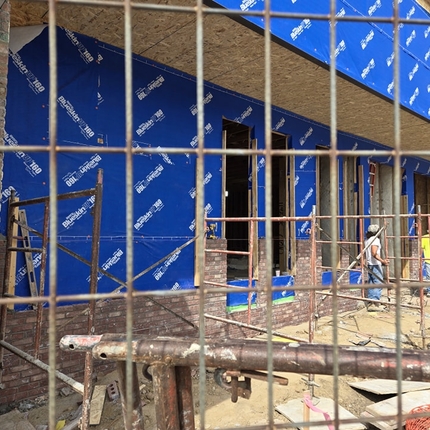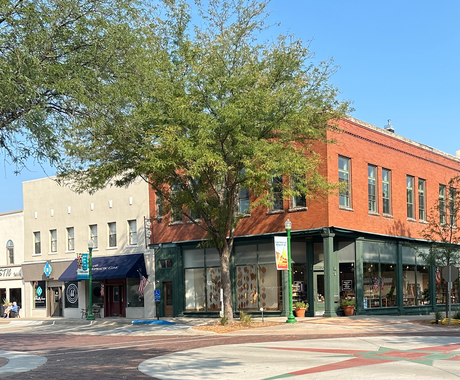Teresa Hoffman, former staff member, contributed to this blog. Click here to see a handout case study featuring Mulholland Grocery.
In the process of rebuilding the Malvern, Iowa, grocery store bearing his family’s name, the “cons” for Tom Mulholland have at times outweighed the “pros.”
The locally owned Mulholland Grocery store had been a fixture on Malvern’s Main Street for nearly 150 years before a fire on Dec. 13, 2021, inflicted severe building damage, including a collapsed roof.
Getting the fire under control and extinguished was a regional effort as crews from Malvern and 19 surrounding communities fought the blaze overnight and into the next day. A week later, after a powerful storm caused significant water damage to the basement, the remaining structure was demolished, leaving the community with not only a visible gap in its downtown facade but also a hole in the hearts of customers who came from near and far to shop.
On paper, the “cons” resulting from the subsequent financial and construction challenges would be reason enough for Tom to give up. But there’s one “pro” that has kept him focused—his love for his hometown.
“I want my community to be taken care of,” Tom said during a visit this summer with staff from the Center for Rural Affairs. “I want them to have a place to go where they can get the fresh fruits, vegetables, meats, and other food they need.”
Mulholland’s was the only grocery store in Malvern before the fire. A Dollar General has since opened on the outskirts of town, but Tom said if residents want fresh food options, the nearest grocery store is 11 miles away, in Glenwood.
“That’s not a big issue for some of our customers, but for many others, it is, especially when you are talking about the Iowa winters and having to get out on the roads and the highways, hoping they are clear,” Tom said. “It’s created a hardship for a lot of people, and I want to get this store rebuilt, reopened, and make it as strong as possible.”
Mulholland’s absence has also had an economic impact, not only for Tom but also for the city itself. Shortly after the fire, Tom said the city council had a special meeting to address the potential loss in tax revenue and the need to amend its budget.
“It’s not a huge amount, but when you are talking about a small town budget, it’s enough to make you question and have to change some things,” he said.
Making his mark with hard work, niche product
The drive and perseverance Tom has displayed in rebuilding his store comes from years of experience in the industry. As is often the case with a family business, Tom started working at Mulholland Grocery as a child and continued as a young adult. He would go on to work for 20 years at Omaha’s locally owned Wohlner's Neighborhood Grocery & Deli.
However, his desire to own and operate a small grocery store remained.
In 2008, while still living in Malvern, Tom realized his dream and became the fourth generation of his family to own Mulholland Grocery.
Tom understood owning a grocery store would be challenging and quickly learned that he’d have to sacrifice his personal time.
“Days off were few and far between, but you do what you have to do,” he said, noting he worked for 400 days straight and, outside of holidays, didn’t take time off in the year that followed.
Equipment failures and other problems associated with wear and tear and from being housed in an older building would follow, along with other day-to-day challenges. With the community’s support, Tom settled into his new role.
There would always be curveballs, COVID-19 being the most significant and unexpected, but Tom relied on the lessons he learned from his grandfather, father, and the owner of Wohlner’s, Mike Schwartz, whom he considered a mentor.
He also found Mulholland’s niche product: sausage. Capitalizing on the skills he acquired as Wohlner’s meat cutter—one newspaper called him possibly the best in Omaha—Tom would soon have visitors from out of town to pick up his sausages. One customer ordered 435 packages of summer sausages to send to friends nationwide during the holidays.
Having a niche, Tom said, is one way to ensure the success of a locally owned business.
“I knew I couldn’t survive from the business of this community alone,” he said. “I had to bring people in from elsewhere.”
Getting emotional, Tom expressed his gratitude for everyone’s support since the fire. He said the “community support” extends beyond Malvern’s city limits.
Working together for a strong, growing community
Although grateful for the support he received after the fire, Tom is not surprised by the gesture. As rural communities across the country face numerous challenges, he describes Malvern, with a population of around 1,000, as a strong and growing community with residents, businesses, and community leaders who look out for one another.
“There are a lot of great things happening,” he said, pointing to the Wabash Trace Nature Trail, art installations, business activities, a new housing development, and the grade school. “We've got a number of strong businesses here that draw people into the community, so we are very lucky in that instance.”
But, he said, many of those projects started with the idea there would be a grocery store in town, which added to his motivation to rebuild.
“Grocery stores are like schools,” Tom said. “When a community has one, more people come to town, and the community is supported.”
Not only does Tom want to ensure a strong economic backbone for Malvern and the surrounding area by rebuilding Mulholland Grocery, but he would also like to further support his community by stocking locally grown products from area farmers and produce growers.
He’ll also continue to be an active participant in the community, which in his opinion is an understood necessity for a business owner.
“I know I can’t do everything, but I can do something,” he said.
As his conversation with Center staff members continued, Tom waved to a community member riding her bike along the Wabash Trail and shared that relationships and reputation matter in a small rural community like Malvern.
By working together, Tom said, the community and businesses will succeed.
Sharing his story to advocate for support
The impact of locally owned grocery stores and the challenges owners face are not going unnoticed at the Statehouse. Earlier this year, the Center worked with Iowa lawmakers to introduce legislation that would provide resources to owners fighting to stay open amidst economic and workforce challenges and competition from big box retailers. While the legislation didn’t advance, the Center’s advocacy efforts continue with the help of people like Tom.
Seeing the benefits his store brings to his hometown, Tom has found an interest in advocating for policies impacting rural communities at the local, state, and national levels. His experiences put him in a position to tell a unique story with an impression that spreads beyond Malvern’s Main Street.
While he’s faced vast challenges daily, securing financial capital has been the greatest. Feeling left behind at times, Tom said he has had to pave his own way.
“Disaster relief funding has been few and far between,” Tom said. “Especially after continuing to serve my community during the pandemic.”
As lawmakers consider legislation to support local grocers, Tom shared that some policy changes may not always lead to solutions. For example, he said, recent tax cuts have not helped many smaller businesses in rural communities where rates are already low.
Tom is also preparing for other hiccups as he progresses to the opening of his store. Employees will have to be trained on the new equipment and daily tasks, as well as working with perishable products, which requires a level of training different from many other businesses.
“The need for staffing support, technical assistance, and improved infrastructure just tack onto the looming financial challenge I will have to overcome,” Tom said.
While Tom believes he will have a few of his old employees back, he hopes to find enough staff to maintain the high-quality products and presentation he expects.
Technical assistance programs, Tom said, can provide an avenue of support, particularly when it comes to understanding compliance factors associated with new policies written into law and how to apply for funding when it becomes available.
Additionally, as he and other longtime store owners contemplate retirement, Tom said programs to assist with the drafting of business transition and succession plans could ensure there is a mechanism to continue the operation.
“If we want to keep independently owned grocery stores [like mine] in business, we must invest in the infrastructure and support rural communities need to thrive, not just survive, in our economy today,” Tom said.
Progress on Main Street
While he continues to look for additional funding to cover expenses, Tom's commitment is paying off with the construction of the new Mulholland Grocery underway on the same Main Street lot. The completion date tentatively set for Dec. 21.
“This is one of the days that I have been waiting for the most; the day the walls start to go up,” Tom wrote in a Sept. 3 post on the store’s Facebook page, where he is providing regular updates. “I know that many people had doubts at times. I know how many times I heard rumors that I had quit and this wasn't ever going to happen. I also know what it means to me to get this opportunity again to help my friends, neighbors, and community.”
Feature photos—Top: Tom Mulholland stands in front the empty lot where his grocery store stood for nearly 150 years before a 2021 fire destroyed it. Construction of the new store is underway. Second photo: Tom has found an interest in advocating for small business owners like himself and this summer met with Center staff, including Cynthia Farmer and Deborah Solie. Third photo: The cars parked along Main Street in downtown Malvern are a sign of what Tom said is a strong, growing community. Bottom photo: Construction crews began the brickwork on the new store in early September.





